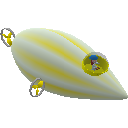 Templates
Templates
2000-01-01
One feature of C++ are templates. Most notable is the STL, but templates also have many other uses. In fact, they are nothing more than better macros. Anything you can do with templates in C++, you also could manage in plain C, using those ugly #define or #include tricks. You write code once, but some details of it, like certain data types or operations, can be replaced. The code is just a template, and each actual instantiation of the code will then have different things filled in.This has a big advantage: You only need to write the code once, so if something changes, then you do not have to adjust multiple versions, with the big risk of doing it wrong in one or forgetting one. Of course, the same could also be done without templates or macros, by using some runtime mechanisms to choose the right version, but that involves conditionals or lookups, and will be much slower. With templates or macros, the compiler will be able to run all of its optimizations ''after'' the code was instantiated. So in the end, there indeed will be multiple versions, but you as programmer only have to maintain one.
Still, the solution is flawed. In C, writing 'macroed' code is not nice, you probably will end up with lots of \ characters after each line, put stuff into #include files, and generally your algorithm will be much harder to read than the specialized version. Often it will be easier to e.g. maintain three separate functions stuck together in some file than having a single function using macros for the three different possibilities.
The same, unfortunately, is true for C++. No doubt, for many things, it usually is nicer to have a templated C++ version than using C macros. But it still makes the code more unreadable than using a fixed version.
This is what I solve with my approach. The idea is simply to use a meta language. So sort of a very powerful #define. I simply write my algorithm in Python, writing out the C code for the compiler to use. That way, I can do it in a way like with #defines or templates, but in many case, can do much better. That's the main idea behind scramble. Keep the simplicity of C, and get all the more powerful features by having the whole Python interpreter as preprocessor.
 ABPS
ABPS Allefant2
Allefant2 Allefant3
Allefant3 Allefant4
Allefant4 Allefant5
Allefant5 Allefant7
Allefant7 Battery
Battery BlitzHack
BlitzHack BloboTron
BloboTron Bob'n'Rob
Bob'n'Rob Command Code
Command Code Donkey
Donkey Doomed
Doomed Dragonfly
Dragonfly Dungeon Simulator
Dungeon Simulator EggHack
EggHack Evil
Evil Feud
Feud Flowers
Flowers Forest
Forest Forest Explorer
Forest Explorer FruitWorm
FruitWorm Garbage
Garbage GnomeGuard
GnomeGuard Hare
Hare Hedgehog
Hedgehog Hydra
Hydra Insanity
Insanity JetFighters
JetFighters Kaos
Kaos Kings
Kings Krampus18
Krampus18 Lawn
Lawn Lunte
Lunte Magnetotron
Magnetotron MarsFight
MarsFight Nefertem
Nefertem The Magical Flower
The Magical Flower Owl
Owl Photon
Photon PI
PI PumpkinForest
PumpkinForest Quest
Quest Red, White & You
Red, White & You Santa Express
Santa Express Shopkeeper
Shopkeeper SIC
SIC Snow Hill
Snow Hill SoF
SoF Squiddle
Squiddle Submarine
Submarine Swarm
Swarm Teacher
Teacher Tom
Tom Troll
Troll 20000
20000 Ultimatum
Ultimatum Velocity
Velocity Wave Rider
Wave Rider Wesnoth GFX Test
Wesnoth GFX Test Witch
Witch X
X xmas
xmas Yellow and Dangerous
Yellow and Dangerous Zombie Master
Zombie Master Zoo
Zoo Galaxy
Galaxy HexMap
HexMap IsometricProjection
IsometricProjection Land
Land VSync
VSync Woosls
Woosls rm -rf wordpress
rm -rf wordpress Allegro 5 regression testing
Allegro 5 regression testing the end of END_OF_MAIN
the end of END_OF_MAIN Mini LDs
Mini LDs Shedskin
Shedskin Retrohack
Retrohack